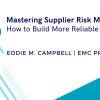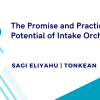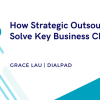In this episode of the Sourcing Industry Landscape, Dawn Tiura interviews Tolga Tomar. Tolga Tomar is Director of Procurement at Thirty-One Gifts, a direct-selling company that empowers women to run their own consulting business. Tomar is a visionary who believes global sourcing is the future of the industry and is passionate about the positive impact it can have on communities across the world.
Dawn Tiura: Hello everybody, this is Dawn Tiura from Sourcing Industry Group, also known as SIG. With me today is Tolga Tomar, and Tolga is just an amazing man that I got to meet a couple years ago. He's a huge SIG advocate, but most importantly, he's a visionary, he's somebody who is always thinking about the future, and about the world.
Dawn Tiura: So his title is Director of Procurement at Thirty-One Gifts, and while not everybody is aware of what this company is, I'm going to spend some time and share with you what it is, because it's really a neat company you need to know about. But I want to get to know Tolga a little bit better over this podcast for all of you to get to know the wonderful man that he is. So, Tolga, thank you and welcome to the Art of Procurement podcast.
Tolga Tomar: Thank you, Dawn, and thanks for the compliment. I appreciate it.
Dawn Tiura: Great. So, if I go way back, you came from Turkey, and you were Istanbul Technical University grad; then you came to the United States, and then you went to UMass, and have an MBA as well, is that correct?
Tolga Tomar: That is correct, yes.
Dawn Tiura: Okay, so you're a mechanical engineer, and now you are in sourcing. So, let's go back to the beginning, when you first came out of school, and I'd love to talk about, what got you into sourcing? So when you first started out, you were more in the supply chain transportation, is that correct?
Tolga Tomar: That is correct, yes. So, when I graduated from my master's program, MBA, in the Boston area, I basically needed to find a job to not only sponsor my Visa to stay in the country, but also obviously something that was gonna interest me. So I was able to find a job in the Chicago area with a company called C.H. Robinson, which is really heavily focused on the transportation logistics management, and I worked there for about six-and-a-half years, and, upon my departure from C.H. Robinson, I got this opportunity at Illinois Tool Works, ITW, as a senior sourcing and senior logistics analyst.
Dawn Tiura: Okay. So, is that where you got your first introduction, then, to supply chain? Was it at that company, at ITW?
Tolga Tomar: Correct, yes. Well, logistics is part of supply chain, right? So at C.H. Robinson, I was really vertically integrated into the logistics piece of supply chain, but hardly any product sourcing or index sourcing at all. I was still doing some of the things that we do on a regular basis like negotiating or sourcing carriers for the shipments that my company was in charge of, but not to the extent that we do on a regular day-to-day basis.
Dawn Tiura: Oh, alright. So you were actually managing the RFPs on full truckloads and international contracts with primary small parcel providers, that type of thing? Is that correct?
Tolga Tomar: That was my role at ITW, that is correct. So that's where I got into the [inaudible], managing RFPs, and looking at more of the sourcing strategies in terms of working, negotiating with carriers, either globally or domestically; national carriers; regional carriers, so it became more strategic than tactical, which I used to do at C.H. Robinson.
Dawn Tiura: So, Tolga, I recall from other conversations, you had talked a lot about the need to have sales skills to be successful, and that you gained those while you were doing sourcing at ITW. Can you tell me a little bit about that, and how did you develop sales skills, and how did you go from full truckloads and less than a truckload to using sales skills?
Tolga Tomar: So, when I was at ITW, at that time, ITW was [a] 100% decentralized organization. I was at corporate, and the company owned about, at that time, again, 300 domestic companies in that United States, and total 900 globally. And it was 100% decentralized, so a business unit, is what we called them back then, had the ability to use carrier A versus business unit located in another city was using a whole different carrier. So there was absolutely no mandate from a corporate perspective. I could just basically sit down at my desk at ITW and draw RFPs, and negotiate contracts, and sign contracts with major carriers in the country.
Tolga Tomar: If I didn't find a way to convince my business partners, about those business units, to use the carriers that corporate chose, it was meaningless. And to do that, I was basically a salesman for more than half the time. I was trying to make a case and to convince the business units at that time, “Okay, if you use this carrier, this preferred partner, you're going to gain X, Y, and Z, and it's going to help you with this from this perspective.” It was truly amazing how much that added into the success of the overall department. There's one thing-
Dawn Tiura: And if-
Tolga Tomar: Go ahead.
Dawn Tiura: I was going to say, did you sell them on more than just cost savings? It wasn't just, “I got a better price than you did."
Tolga Tomar: No, absolutely, it wasn't cost savings only, because there's always someone cheaper out there, and when we work with our preferred carriers, partners back then, we basically created a whole big portfolio of things and then we went into those business units with our homework done. “Hey, if you switch from this to this, not only are you going to save some money, but you're going to gain this thing, give that flexibility.” And for the most part, it was a home run. There were some instances where we basically, the business units was adamant about using the supplier of their own choice. And at that time, we just basically, “Okay, that's fine, we'll just come back to it in a year.” And eventually I see these business units coming back to us because, when they talk to other business units, they were realizing the benefit that they were gaining using corporate carriers versus them, so there was some sort of an indirect selling there, too. The project sold itself.
Dawn Tiura: That's great, because I think so many people don't see procurement people as sales people, they see them as order takers. And it's so much more than that to be successful, so that's really exciting. So when you left ITW, then you went to Cardinal Health, and you sourced some pretty interesting items there, if I recall. Can you share a little bit about that experience?
Tolga Tomar: Sure. So, just to recap ITW, Illinois Tool Works, I was doing only indirect sourcing, 100%, there was no direct product sourcing at that time. But when we decided to move to Columbus for family reasons, and I got this opportunity with Cardinal Health, the team that I joined at Cardinal Health was in charge of direct sourcing. And so all of a sudden, I was sourcing items like wheelchairs, crutches, to electrodes, to body bags—I think that's a funny one. And it was interesting because I never sourced of these items before, and there was an element of China sourcing as well as U.S. domestic sourcing, but it was through a seven step process driven strategic sourcing. And while the basic principles of sourcing between indirect and direct are very similar, there were a lot of pieces to it when it came to direct sourcing at Cardinal Health, and I must say, I learned a lot. That was a truly amazing three years that I spent there.
Dawn Tiura: That's amazing. So, can I ask you a question about body bags, is it one size fits all?
Tolga Tomar: (laughs) Yes, it is, actually. And it is latex-free, too, so that's funny. People joke about it, why do you care?
Dawn Tiura: Why would you care when you're dead?
Tolga Tomar: Well, it's the nurses that handle the bags, basically.
Dawn Tiura: Oh.
Tolga Tomar: Yes, and it's an interesting product, and it comes with a toe tag. There were a couple of times that I used in really heated conversations, and to calm the other person down, I'm like, "Listen, me and you are going to end up with this, so you may have to redo your perspective on this matter, so calm down a little bit." And it works, it really does work.
Dawn Tiura: “I carry a body bag with me, be careful.” (laughs)
Tolga Tomar: (laughs)
Dawn Tiura: That's awesome. So from there, now you're in Ohio, and then you came upon this amazing company called Thirty-One Gifts, and folks, for you guys that are listening right
now, if you don't know this company you need to look it up because they have a mission that I think is absolutely phenomenal. And I think that's even more exciting is, I'm talking to a man who is going to share his thoughts on a woman-owned corporation and how they're affecting women around the world, so, can you share that please?
Tolga Tomar: Absolutely. So, if you're not familiar with Thirty-One Gifts, we are a direct selling organization. Basically, we have over 60,000+ consultants out there who sell our products every day. And, as part of our motto, we don't sell our products through retail stores or direct to the final end customers, every product we sell goes through a consultant. And not only [do] consultants gain some value out of it, commission, but also it empowers them, and that's the amazing spirit that this organization is based on.
Tolga Tomar: In terms of history, Cindy Monroe started this company out of Tennessee about fifteen years ago. In fact, we're celebrating our fifteenth year in 2018. And she basically not only wanted to create a business for herself and build her career on top of it, but also she wanted to empower women. I am so happy to be part of this organization where we empower women from all over the country, not only in the U.S., but also in Canada, and with some plans to expand into other countries. But also, you hear these stories from these amazing ladies that some are really facing really difficult financial times; some are basically trying to get that extra funding so they can take their kids to a vacation; or some basically as simple as just buying a new car. It is just not about making money at all for us, it's about making sure these women had a say in their lives and that they have the financial freedom to do the things that, in some cases, that they need to do or they'd like to do.
Tolga Tomar: As a man who has a mother and a wife and a daughter, this is an amazing cause for me, especially in this day and age with the Me Too movement, that the women out there and all these unfortunate stores that we hear, it is even more rewarding to be part of such a great organization. So I would strongly recommend everyone take a look at our website or contact me if you'd like to learn more about us, and how we partner with ‘her’ out there, with all the ladies out there.
Dawn Tiura: I love that. I love that story—and especially having it, the passion, that you speak, as a man, about empowering all these women, I just wish there were more people like you. It's just heartwarming, so thank you. So tell me, what do you do at Thirty-One Gifts, tell me what you're doing today, or these days.
Tolga Tomar: I've been here almost eighteen months or so, and my team, we are called the procurement team. We basically focus mostly on the indirect spend that the organization has, and we have several different commodities that we work with. We also have some direct commodity items that we're sourcing, not that many that is very…is more focused so far is we have a third-party sourcing partner that our organization paired up with, they are managing that piece. However, we work in really with spirit hand-in-hand, making sure that we provide the best value to our internal stakeholders as it comes to products; service; cost; quality.
Tolga Tomar: One interesting story that I want to share, when I started at Thirty-One, the department's name was “purchasing.” Everybody referred to us as the purchasing team, purchasing team members. And a few months after I started, with my boss's support, I basically pitched the idea of renaming our team from “purchasing” to “procurement.” And, Dawn, you and I have discussed this before: purchasing is a tiny fraction of procurement. I think that helped my team a lot internally to sell the value that we can bring in to our internal business partners. Not only we are purchasing goods, Dawn, you know this, and other sourcing professionals, gosh, we manage risk, we manage cost savings, we manage supply chain, we manage quality, or work with individuals who manage those areas. We don't just come into our offices and write POs every day. That change was taken really well by the organization, which helped my team to gain a lot more traction all across the organization.
Dawn Tiura: And you're definitely playing to my music, is that we do so much more, we're not, and I hate the word “buyer.” Unless you're buying fashion, it's not a sexy title. We don't buy, we're sourcing.
Tolga Tomar: I renamed those titles. We had them, too. We don't have any buyers anymore.
Dawn Tiura: Good! Oh my gosh, that's great. I'm so excited that you're drinking the same Kool-Aid, so that's great.
Dawn Tiura: So you implemented a procurement process map, right, and then you chose your procurement tool. Can you share which tool you chose, and why?
Tolga Tomar: Sure. So, procurement process map, let me talk a little bit about that. So, that was one of the first things that we did as a team. One thing that I want to add in there, we did not create that in isolation, just within our group. We made sure that every internal client, internal customer of ours was present as we developed that procurement process map. So not only, this enables them to take ownership of that process map, but also, we gained from their knowledge and experience. So we tapped onto that knowledge, some of them have great ideas that they've seen at other companies that they've worked in their past, so I want to mention that. It wasn't a process that is created just within my team.
Tolga Tomar: As it comes to the second part of your question, we basically did conduct an RFP for e-procurement, e-sourcing tools out there, and upon going through a lot of these steps of irregular actual sourcing exercise, we signed a contract with Scanmarket. It's a company based out of Denmark, and they have offices in the U.S., and we are, right now, implementing the program. And, I'm not a salesman of Scanmarket, but I've got to tell this about them—that the tool's extremely easy to use, it's like using Facebook. Very, very easy, all it takes is just do the one time and then, next thing you know, you're running an RFP on the tool. So that was one of the main reasons for us to make that decision.
Dawn Tiura: Interesting. Yeah, and that's a company that I don't know as well as the other ones, so that's one of the reasons I wanted to make sure that we mentioned that. So, tell me, what are your future plans? What do you want to do at Thirty-One Gifts that you have not had the opportunity to do before? Where do you see your career taking shape?
Tolga Tomar: In terms of what I do next here or, who knows, maybe somewhere else? Although I don't have any plans or intention to be anywhere else, especially working at such an amazing company here. Sourcing is my passion, Dawn. I really enjoy and love what I do. This is, I think I mentioned this to you before, this is not a job to me, it's like a hobby. And because I think I believe this way, future is an extremely piece of what I do on a day-to-day basis. I always want to be thinking about what I'm going to be doing in the next year, or two years, or three years out, internally, within this organization, that's going to add value to our bottom line. I can't just come into this work and then, “Okay, it's been done this way for so long, I'm just going to keep doing it the same way.” Having said that, I am very interested in new ideas, innovation, and different pieces, and especially thinking outside the box. You and I both, we agree, I think that we live in a global world. We need to accept that.
Dawn Tiura: Mm-hmm.
Tolga Tomar: While it's amazing to support domestic U.S.-based companies or regional companies, there is definitely a niche for that, we have to open our horizon to other possibilities globally. Why not look for a talent company, or a consultant company out of Africa, or South America, or why not source products from Brazil or Portugal. Not only in China, but there are so many good things happening all over the world, and with Internet, and websites like Alibaba, this information is more accessible than ever. We basically use third-parties to even audit these locations so that way we know that we're safe, so I don't even have to leave my desk at some cases to know more about an organization than actually visiting them and understanding them. So, global sourcing is the future in my opinion, and if organizations fail to adapt that thinking, I don't think they're going to move forward much ahead in the sourcing. Again, this is just my opinion.
Dawn Tiura: No, I agree. Obviously, politics both here and abroad, there's a lot of nationalism going on right now, but it's almost, you can't unsee something you saw, so you can't undo global once you've gone global. Global, once it happens, it's out of the box, it's hard to go back in and say, “Now I'm going to only focus nationally.” So I absolutely, positively agree. And we can impact. I think the part that I hear you as well is, we can impact countries that are having issues, we can do impact sourcing by helping countries and cities and small towns and villages by procuring their products and using their talent set. So, I just think that's absolutely fantastic that you have that perspective.
Tolga Tomar: Yeah, I'm a Turk, I always make that joke: I'm a Turk who lives in Columbus, United States, sourcing products from China. You can't get any more global than that. We have to really keep that open mind, and, in my mind, there is no, "Okay, it's been set this way. Don't touch it." It's the future, we have to keep an open mind and question everything. At least give it a shot, take a look at it. That's my perspective on the whole global piece.
Dawn Tiura: Absolutely. And I hope you're going to be getting involved in this SIG innovation accelerator as well, since your focus is so much on technology and changes and all of that, so I'd love to have you involved in that as well.
Tolga Tomar: I would love to, yes.
Dawn Tiura: That's great.
Dawn Tiura: So, any parting comments, then, because, what I want to do, folks, for all of you listening, Tolga is so approachable and from the first day I met him I knew we were going to be friends. And so I encourage you to reach out, reach out to me, reach out to Tolga directly, if you don't have his contact, reach out to anyone at SIG and we'll help you get in contact, but he's someone you should have in your network. He should just be someone you look up when you want to brainstorm something. So Tolga, I'm glad you offered to be accessible.
Dawn Tiura: So with that, are there any parting comments for Art of Procurement today?
Tolga Tomar: I think I'm just going to echo what I said earlier. We're at a day and age that we have to think globally, thinking outside the box, and always, always be innovative, or try to find a way to implement the latest technology out there. It doesn't mean that everything is going to work all the time, but if you don't get uncomfortable, try these new things, the chances of us advancing—both in our careers and/or the organization's we work for—is going to be very slim. So that's what I like to keep in mind all the time, that's what I challenge my team, and I think that is the future for any sourcing professional.
Dawn Tiura: That's fantastic. So you were nominated, I don't know if you knew that, for the podcast, and the explanation as to why you should be on the podcast, not that I wouldn't have chosen you myself: but they said that you, “exude qualities of leadership, and in terms of strategic sourcing, you have vast industry and functional experience, and you lend credibility to your candidacy as a procurement specialist who can add value through conversations that take place in the Art of Procurement platform.” So kudos to you, because you impressed some folks that wanted to nominate you for this podcast, and that was their quote. So I'm lucky to know you, and other folks, you'd be lucky to know Tolga as well.
Tolga Tomar: Thank you, Dawn. Thank you for the nice compliments for the individuals that referred me. It's very nice to hear them. And one other thing that I want to mention: if you are not part of SIG or thinking about joining SIG, I would strongly recommend this to any organization out there. It's been two plus years since I got introduced to SIG. It's an amazing vault of knowledge, pocketed in a very small area, so if you're not tapping into that, you're missing it out.
Dawn Tiura: Well, thank you.
Tolga Tomar: I wanted to mention that.
Dawn Tiura: I appreciate that. And I'll see you soon, up in Columbus, when we come on up there in, I think, just a month or two. So take care, and Tolga, thank you again for joining me on Art of Procurement.
Tolga Tomar: Thank you very much again, Dawn. Much appreciated. Have a wonderful day.
Dawn Tiura: Thank you, you too.
Tolga Tomar: Bye-bye.
Dawn Tiura: Bye.








